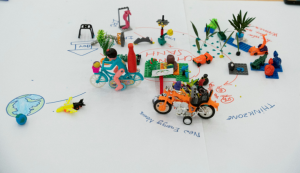In today’s dynamic landscape of corporate social responsibility, businesses face an unprecedented opportunity: to transform their workplace cultures from profit-driven environments into ecosystems that deliver meaningful positive impact—while sustaining profitable growth. In the modern business world, true brand power transcends sales revenue. It lies in the change you create. Companies that make tangible, positive differences in the world earn recognition not just for their financial performance but also for their leadership in addressing critical global challenges.
One way businesses can excel in this domain is by drawing inspiration from elite athletes. Take Tom Brady, widely regarded as the greatest NFL quarterback of all time. His unparalleled success stems from structuring his life around optimizing performance. Elite athletes like Brady are driven less by money or fame and more by an intrinsic “goal orientation” that elevates their pursuits into a central organizing principle.
Adopting this mindset in the realm of corporate social impact can revolutionize how businesses approach “doing good.” By applying the same rigor, commitment, and results-driven focus to charitable efforts as they do to core business operations, companies can achieve transformative impact.
Just as athletes build strength through deliberate training that pushes them beyond their comfort zones, businesses must cultivate their “charitable muscles” by embracing discomfort. Growth occurs at the edges of comfort. For athletes, physical strength emerges from microtears in muscle fibers that heal and grow stronger. Similarly, making a significant corporate impact requires pushing past the familiar.
This could mean increasing philanthropic giving beyond the usual threshold, dedicating more staff time and resources—including senior leadership involvement—or reevaluating cause areas, partnerships, and measurable outcomes. Businesses must stretch their mental muscles by exploring innovative approaches and quantifying the results of each initiative.
Ultimately, building corporate charitable strength requires an attitude of striving for greater impact and accepting the short-term discomfort necessary to achieve it. Just as elite athletes embrace calculated sacrifices—foregoing certain pleasures to pursue their goals—companies must be willing to sacrifice some profit or operational convenience to create meaningful change.
This principle applies not only to the organization but also to the individual behaviors modeled and encouraged among employees. People are naturally influenced by the examples around them. Forward-thinking companies celebrate and nurture inspiring individual contributions, recognizing that even modest efforts, when pooled strategically, can yield remarkable results.
That said, calculated sacrifice doesn’t mean recklessness. A company that gives to the point of compromising its financial health won’t survive to continue its mission. Instead, it’s about thoughtfully balancing trade-offs—accepting short-term costs for long-term gains in areas like alleviating suffering and fostering societal well-being.
Consider Patagonia, which manages its growth to prioritize environmental stewardship, or TOMS Shoes, which overhauled its giving model after reevaluating its impact. These companies thrive because they embrace the challenge of making thoughtful trade-offs rather than ignoring them.
This approach isn’t just altruistic—it’s strategic. Businesses that integrate meaningful social impact into their cultures often see enhanced employee engagement, as purpose-driven environments attract and retain top talent seeking meaning beyond a paycheck. According to a 2022 Deloitte survey, 86% of employees who felt their company made a positive impact reported higher job satisfaction.
Additionally, these organizations forge stronger public relationships, as consumers increasingly favor brands committed to authentic change. Solving societal challenges can also spark innovations that benefit the core business, creating a virtuous cycle of impact and profitability.
For companies aiming to embed social impact into their culture, the first step is a candid assessment: Are current initiatives built for convenience or for meaningful change? What if we approached charitable impact with the same focus and discipline that elite athletes bring to their craft? What if we quantified our efforts as rigorously as we measure profits?
The business landscape is shifting toward a future where the most respected and influential companies won’t just be those with the highest revenues, but those that leave the deepest, most meaningful mark on the world.
Nick Cooney is Founder and Managing Partner at the venture capital firm Lever VC and the author of What We Don’t Do: Inaction in the Face of Suffering and the Drive to Do More.










